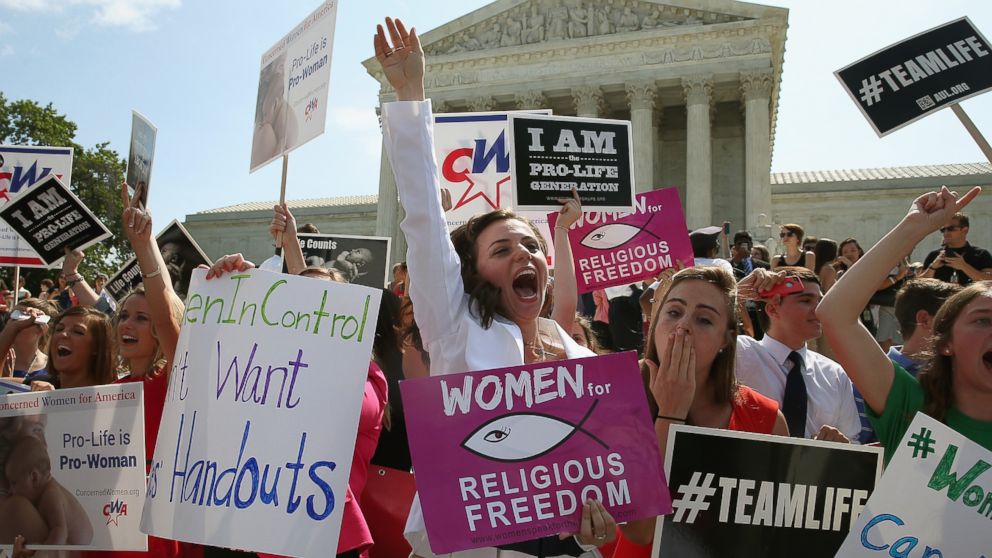Hobby Lobby Wins Contraceptive Ruling in Supreme Court
— -- In a deeply divisive case pitting advocates of religious liberty against women’s right’s groups, the Supreme Court said today that two for profit corporations with sincerely held religious beliefs do not have to provide a full range of contraceptives at no cost to their employees pursuant to the Affordable Care Act.
In a 5-4 opinion written by Justice Samuel Alito the court held that as applied to closely held corporations the Health and Human Services regulations imposing the contraceptive mandate violate the Religious Freedom Restoration Act. Alito was joined by Chief Justice John Roberts, Justice Antonin Scalia and Justice Clarence Thomas. Justice Anthony Kennedy filed a concurring opinion.
The decision is a victory for the Green family that owns Hobby Lobby, an arts and crafts chain, and the Hahns who own Conestoga, a cabinet making company, who had challenged the so called contraceptive mandate saying it forced them to either violate their faith or pay ruinous fines. They object specifically to four of the drugs and devices at issue because they say they have the potential to destroy an embryo. The government defended the provision as an essential part of health care coverage for women.
Supremes Consider Contraception Challenge
3 Questions Facing the Supreme Court in Contraception Case
Planned Parenthood Goes After Sen. McConnell With New TV Ad
Here's what you need to know about the decision:
What did the court rule?
The court rejected the government’s claim that neither the owners nor the corporations could bring a religious liberty claim. “Protecting the free-exercise rights of corporations like Hobby Lobby, Conestoga … protects the religious liberty of the humans who own and control those companies,” Alito wrote.
Alito said the court has “little trouble” concluding that the HHS contraceptive mandate substantially burdens the exercise of region: "The Hahns and the Greens believe that providing the coverage demanded by the HHS regulation is connected to the destruction of an embryo in a way that is sufficient to make it immoral for them to provide the coverage.”
What else did Alito hold in his majority opinion?
Although the Government argued the mandate was essential to providing a full range of benefits for women’s health, Alito said, “the Government has failed to show that the contraceptive mandate is the least restrictive means of furthering that interest," according to the majority opinion.
Alito wrote that the owners of Hobby Lobby believe that the coverage required of the health care law "is connected to the destruction of an embryo in a way that is sufficient to make it immoral for them to provide the coverage … HHS [Department of Health and Human Services] has not shown that it lacks other means of achieving its desired goal without imposing a substantial burden on the exercise of religion by the objecting parties in these cases.”
Alito said the opinion was limited to closely held corporations: “Our decision should not be understood to hold that an insurance coverage mandate must necessarily fall if it conflicts with an employer’s religious beliefs. Other coverage requirements, such as immunizations, may be supported by different interests (for example, the need to combat the spread of infectious diseases) and may involve different arguments about the least restrictive means of providing them. “
What did Ginsburg's dissent say?
Justice Ruth Bader Ginsburg wrote a dissent, joined on the merits by Justice Elena Kagan, Sonia Sotomayor, and Stephen Breyer.
In her dissent Ginsburg –disagreed with Alito --and worried about what other challenges might come next. :”Reading the Act expansively, as the court does, raises a host of “Me, too” questions. Can an employer in business for profit opt out of coverage for blood transfusions, vaccinations, antidepressants, or medications derived from pigs, based on the employer’s sincerely held religious beliefs opposing those medical practices.”




